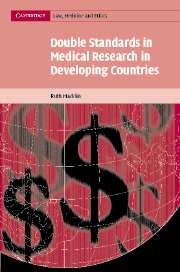Book contents
- Frontmatter
- Contents
- Acknowledgments
- 1 International research contested: controversies and debates
- 2 Maintaining ethical standards in research
- 3 Striving for justice in research
- 4 Avoiding exploitation
- 5 Providing safeguards: informed consent and review of research
- 6 Making drugs affordable
- 7 Respecting, protecting, and fulfilling human rights
- 8 Striving for a single standard
- Index
8 - Striving for a single standard
Published online by Cambridge University Press: 12 November 2009
- Frontmatter
- Contents
- Acknowledgments
- 1 International research contested: controversies and debates
- 2 Maintaining ethical standards in research
- 3 Striving for justice in research
- 4 Avoiding exploitation
- 5 Providing safeguards: informed consent and review of research
- 6 Making drugs affordable
- 7 Respecting, protecting, and fulfilling human rights
- 8 Striving for a single standard
- Index
Summary
Discussing international ethical guidelines for biomedical research, a bioethicist from Africa wrote:
[W]e need, in particular, as far as biomedical research goes, to make appropriate distinctions between the ethics of developed world research in the developing world, collaborative or cooperative research between the developed and developing worlds, developed world research in the developed world and developing world research in the developing world.
What is to be gained by making all these distinctions? One possibility is that making such distinctions would yield different ethical obligations, different rules, or different standards in these various contexts. However, the African bioethicist insisted that “the general moral principles that should guide correct moral action would be the same” at these different levels, and further: “while the use of double standards can never be morally justified, different standards are not only permissible but also inevitable.” The challenge, then, is to specify the criteria for distinguishing standards that are merely “different,” and therefore allowable, from those that are “double,” and hence unacceptable.
A bioethicist from the United States offered an analysis intended to show the possibility of accepting universal ethical standards for research while permitting differences in what is provided to research subjects in developed and developing countries. The key to this analysis lies in distinguishing the ethical principles that apply to particular research endeavors from other aspects, such as the research design. The relevant ethical principles embody the well-known and widely accepted requirements of informed consent, reasonable risks in light of potential benefits, and minimization of risk. As long as those universal ethical principles are fulfilled, according to this account, the research can be judged ethically acceptable.
- Type
- Chapter
- Information
- Double Standards in Medical Research in Developing Countries , pp. 226 - 262Publisher: Cambridge University PressPrint publication year: 2004

